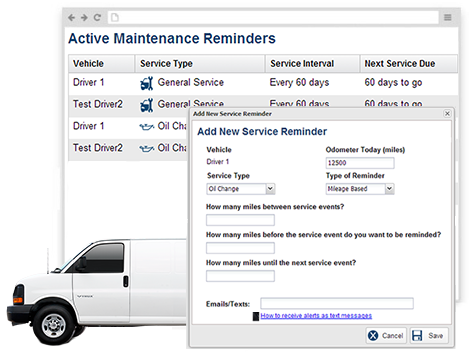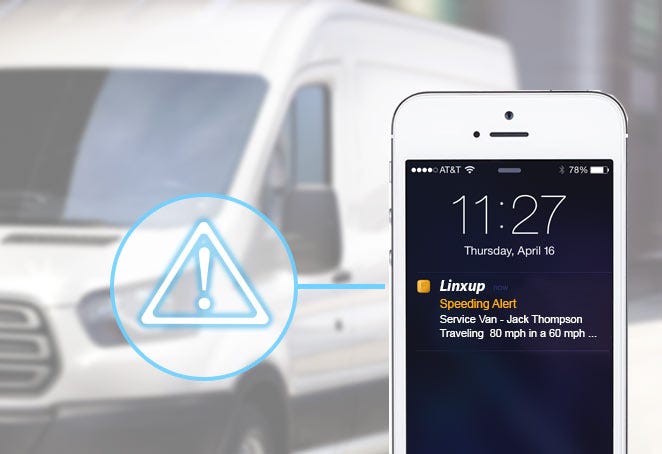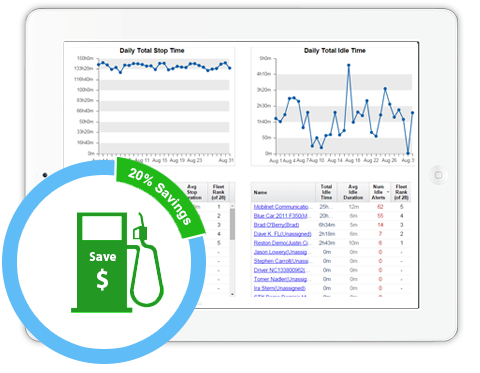According to the Department of Energy, you can assume that each 5 MPH you drive over 60 MPH is the equivalent of an additional $0.21 per gallon of gas.
When you manage a small or medium-sized business, you’re responsible for making critical decisions, such as how to address speeding, that could have a significant impact on your business’s bottom line every day.
Fleet-based businesses are faced with the additional challenge of managing employees who operate vehicles and work in the field. Without the ability to observe workflows and employee behaviors first-hand, managers of fleet-based businesses often have to make decisions based on limited information or anecdotal evidence provided by their drivers and customers. This disconnect can lead to a number of common fleet management mistakes, and can ultimately cost your business big money. Here’s the good news: many of the most common fleet management mistakes are easy to correct using GPS tracking devices.
Here are five of the most common fleet management mistakes:
1. Not having a preventive maintenance schedule
Following a routine maintenance schedule keeps your vehicles operating in peak condition at all times. In addition to increasing their lifespan, preventive maintenance decreases the likelihood that your vehicles will unexpectedl
y break down. Between repair costs and revenue lost while your vehicle is out of commission, avoidable breakdowns caused by poor maintenance can cost your business a lot of money
When you track your fleet vehicles with a GPS tracking device, you can maintain accurate vehicle maintenance history reports and set up email or text message alerts for when maintenance is due so you never miss a tune-up“ or have an unexpected, preventable breakdown again.

2. Failing to track and update routes
Inefficient routing increases the number of miles your vehicles drive, which can waste time as well as fuel and decrease the number of clients your employees can serve each day. By tracking your driver’s daily routes with a GPS tracking device, you can identify opportunities to improve dispatch and routing, reduce fuel usage, and increase your revenue by reaching more customers every day.
3. Doing nothing to stop unsafe driving habits
Unsafe driving hurts everyone, not just your business. According to the National Highway Traffic Safety Administration (NHTSA), dangerous and distracted driving are the leading causes of vehicle crashes in the United States. Crashes and collisions are inevitable, but they can be prevented by monitoring driver safety using GPS tracking devices. The most capable GPS tracking devices provide real-time alerts for unsafe behavior such as speeding, harsh braking, and rapid acceleration, as well as detailed driver safety report cards. Fleet managers can use these alerts and reports to proactively identify unsafe drivers and take steps to encourage driver safety.
Learn more about increasing driver safety using GPS vehicle trackers.
Unsafe driving also increases your fleet’s risk of getting ticket, which can subsequently increase your fleet’s insurance premiums. Beyond the cost of repairs, downtime, increased insurance premiums, and damage to materials, crashes and collisions can also generate bad publicity and negatively impact your relationship with your customers. This can lead to lower revenues on top of the costs associated with repairing any damaged vehicles.
Failing to encourage and enforce safe driving habits can also cause unnecessary wear and tear on your vehicles, as well as waste fuel. Driving habits like harsh braking, rapid acceleration, and speeding significantly contribute to high fuel consumption. Understanding your employees’ personal driving habits can help you coach them on how to improve their behavior behind the wheel so they can become better, more fuel-efficient drivers.
Read more about protecting your fleet using GPS tracking devices.
4. Not knowing how your drivers behave in the field
 When you don’t monitor how your drivers behave in the field, you have to trust that they are obeying the rules of the road and following the regulations your company has set out. While the majority of your fleet may operate their vehicles safely and efficiently, there may be some employees who regularly engage in preventable unsafe or wasteful driving habits. These habits can increase your risk of collision, as well as increase your operating costs.
When you don’t monitor how your drivers behave in the field, you have to trust that they are obeying the rules of the road and following the regulations your company has set out. While the majority of your fleet may operate their vehicles safely and efficiently, there may be some employees who regularly engage in preventable unsafe or wasteful driving habits. These habits can increase your risk of collision, as well as increase your operating costs.
Understanding how your drivers behave in the field can help you improve your business’s operations in a number of ways, such as:
- Reducing fuel usage and costs
- Accurately tracking actual work hours and job progress
If even one of your drivers regularly exceeds the speed limit by 20 MPH, you could be spending up to an additional $0.84 per gallon of gas, and those costs can add up quickly.
GPS tracking devices make it easy to identify and address inefficient driving habits like speeding; in fact, GPS tracking features like alerts for wasteful behaviors have helped many fleets reduce their fuel consumption by up to 20%.
GPS tracking devices also provide up-to-the-minute information on vehicle locations. If a customer disputes their bill, you can use this information to clarify driver locations and resolve the dispute.
5. Not monitoring after-hours use
Small businesses often have a more difficult time identifying fraud and recouping those losses.
Unauthorized and after-hours use can be hard to identify, but when you track your vehicles with a GPS device, you can receive alerts in real-time whenever a driver uses their vehicle inappropriately, such as:
- After work hours
- Tampering with GPS tracking device
- Driving the vehicle outside of approved areas
In addition to preventing employee fraud and unauthorized use, these alerts can also help you quickly recover your vehicles or heavy equipment in the event of theft.
Make no mistake
Often, there’s no easy way to determine whether you’ve made the right decision for your business, especially when your employees operate in the field all day. When you can rely on accurate insights provided by GPS vehicle trackers, you can make data-driven decisions that will improve driver safety, increase productivity, and reduce your fleets operating costs. Learn more.


